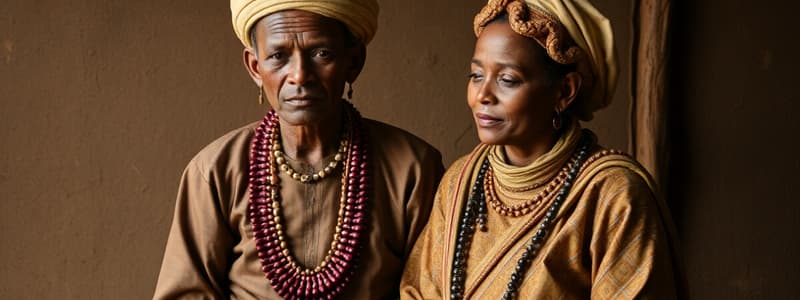Podcast
Questions and Answers
Who is considered the father of modern anthropology?
Who is considered the father of modern anthropology?
- Franz Boas (correct)
- H. Otley Beyer
- Max Weber
- Emile Durkheim
What is the primary focus of sociology?
What is the primary focus of sociology?
- The study of cultures and world-views
- The historical context of human evolution
- The behavior of political institutions
- The systematic study of groups and societies (correct)
What theory did H. Otley Beyer contribute to anthropology?
What theory did H. Otley Beyer contribute to anthropology?
- Theory of Cultural Relativism
- Wave Migration Theory (correct)
- Theory of Bureaucracy
- Theory of Positivity
Emile Durkheim is famous for which of the following works?
Emile Durkheim is famous for which of the following works?
Which of the following is NOT a reason for studying anthropology?
Which of the following is NOT a reason for studying anthropology?
What is the main goal of the Philippine Sociological Society?
What is the main goal of the Philippine Sociological Society?
What does cultural relativism primarily emphasize when examining another society?
What does cultural relativism primarily emphasize when examining another society?
Which type of social group is characterized by intimate and private relationships?
Which type of social group is characterized by intimate and private relationships?
Which stage is NOT part of Auguste Comte's theory of positivism?
Which stage is NOT part of Auguste Comte's theory of positivism?
What kind of social organization is labeled as normative?
What kind of social organization is labeled as normative?
What does political science primarily study?
What does political science primarily study?
Which is NOT an agent of socialization?
Which is NOT an agent of socialization?
Which of the following best defines an aggregate?
Which of the following best defines an aggregate?
What does the term 'in-group' signify?
What does the term 'in-group' signify?
What is the main characteristic of a coercive social organization?
What is the main characteristic of a coercive social organization?
Symbolism is best understood as:
Symbolism is best understood as:
Which of the following best describes culture according to Edward Tylor?
Which of the following best describes culture according to Edward Tylor?
What role does language play in culture as described in the content?
What role does language play in culture as described in the content?
Which characteristic of culture defines what people believe should or should not be done?
Which characteristic of culture defines what people believe should or should not be done?
What is one of the strengths of ethnocentrism as mentioned in the content?
What is one of the strengths of ethnocentrism as mentioned in the content?
According to Bronislaw Malinowski, what is the nature of culture?
According to Bronislaw Malinowski, what is the nature of culture?
What does the concept of proscriptive norms refer to?
What does the concept of proscriptive norms refer to?
What type of behaviors are laws intended to regulate within a society?
What type of behaviors are laws intended to regulate within a society?
What is a potential weakness of ethnocentrism mentioned in the content?
What is a potential weakness of ethnocentrism mentioned in the content?
What key aspect did Niccolo Machiavelli differentiate in his political thinking?
What key aspect did Niccolo Machiavelli differentiate in his political thinking?
Which of the following is NOT a type of society as defined in the content?
Which of the following is NOT a type of society as defined in the content?
Which thinker emphasized the concept of collective consciousness in society?
Which thinker emphasized the concept of collective consciousness in society?
What characteristic defines agrarian societies?
What characteristic defines agrarian societies?
What did Aristotle mean by stating 'Man is by nature a social animal'?
What did Aristotle mean by stating 'Man is by nature a social animal'?
In which society were power systems primarily based on land ownership?
In which society were power systems primarily based on land ownership?
Why is the study of political science considered essential in many careers today?
Why is the study of political science considered essential in many careers today?
Which type of society is marked by occupation specialization and a shift towards factory work?
Which type of society is marked by occupation specialization and a shift towards factory work?
Flashcards are hidden until you start studying
Study Notes
Anthropology
- The study of people in all times and places, focusing on what makes us human.
- Considered the foundation of many social and behavioral sciences.
- Pioneers include Franz Boas (Father of Modern Anthropology), H. Otley Beyer (Anthropology in the Philippines), and Ugnayang Pang-Agham Tao (organization of Filipino anthropologists focused on Philippine society).
- Studying anthropology broadens perspectives, promotes understanding of diverse cultures, and encourages respect for different ways of life.
Sociology
- The systematic study of groups and societies, focusing on their structures and how they influence behavior.
- Covers diverse topics such as crime, religion, family, and social class divisions.
- Key thinkers include Auguste Comte (Father of Sociology), Émile Durkheim, and Max Weber.
- The Philippine Sociological Society aims to promote sociology in the Philippines.
- Studying sociology expands experiences and encourages understanding of different customs.
Political Science
- The study of governments, public policies, and political behavior.
- Analyzes complex behavior of political actors, institutions, and processes.
- Examines how collective decisions influence individual choices and societal outcomes.
- Key thinkers include Aristotle (Father of Political Science), Niccolò Machiavelli, and Miriam Defensor-Santiago.
- Studying political science deepens understanding of political forces and empowers individuals to participate in societal change.
Society
- A large group sharing a geographical territory, common culture, social structure, and legal framework.
- Key perspectives on society include:
- Auguste Comte: Society is a harmonious organism.
- George Mead: Society is an exchange of symbols.
- Talcott Parsons: Society is a complex network of relationships.
- Émile Durkheim: Society is a distinct entity with collective consciousness.
- Society is characterized by culture and social structure.
Types of Societies
- Pre-industrial:
- Hunting and gathering societies: Simplest societies, reliant on hunting and gathering for sustenance.
- Horticultural and pastoral societies: Societies that utilize hand tools for agriculture and domesticate animals.
- Agrarian societies: Societies marked by large-scale agriculture and the use of plows.
- Feudal societies: Societies structured around land ownership and power systems, often with a hierarchical structure.
- Industrial societies: Societies characterized by rapid technological advancements, factory work, and specialization.
- Post-industrial societies: Societies primarily focused on information and service provision, often referred to as information or digital societies.
Culture
- Cultivation of knowledge, belief, art, morals, law, customs, and behaviors.
- Key perspectives on culture include:
- Edward Tylor: Culture encompasses all aspects of human life learned through social interaction.
- Bronislaw Malinowski: Culture is an integrated functioning whole, with each element having a purpose.
- Alfred Radcliffe-Brown: Culture is the transmission of traditions that perpetuate society.
- Culture includes material and non-material elements.
Elements of Culture
- Symbols: Objects, words, or actions with a specific meaning recognized by members of a culture.
- Language: A system of symbols that allows for communication, knowledge transmission, and cultural preservation.
- Values: Cultural standards guiding behavior, defining good and bad, and influencing choices.
- Beliefs: Statements held to be true within a culture, reflecting shared convictions about the world.
- Norms: Societal expectations guiding behavior in specific situations, including proscriptive (what should be done) and prescriptive (what should not be done) norms.
- Laws: Formally codified rules enforced by a governing body to regulate diverse behaviors and beliefs within society.
Ethnocentrism
- Judging other cultures based on the standards of one's own culture.
- Can promote stability, preserve traditions, and enhance solidarity.
- But it can also hinder progress, reinforce in-group/out-group mentality, and contribute to prejudice and racism.
Cultural Relativism
- Understanding other cultures by their own terms, values, beliefs, and motivations.
- Encourages tolerance and appreciation of cultural differences.
Symbols
- Objects, words, or actions that stand for something else without a natural connection. They are culturally defined and help people understand the world.
- Symbolism involves layers of meaning and requires awareness of cultural background.
Types of Symbols
- Cultural symbols: Symbols specific to a particular culture (e.g., national flag).
- Social symbols: Symbols related to social groups or relationships (e.g., wedding ring).
- Political symbols: Symbols representing political ideology or movements (e.g., political parties, social movements).
Socialization
- The process of learning to participate in group life and being taught societal norms.
- Enculturation is the process of being socialized into a specific culture.
Agents of Socialization
- Family: The primary agent of socialization, shaping early development and values.
- School: Provides education and socialization into broader societal norms.
- Peer group: Provides social interaction and peer influence.
- Religion: Imparts moral and ethical values.
- Government: Enforces laws and shapes social behaviors through policies.
- Mass media: Influences attitudes, values, and behaviors through various forms of media.
Aggregate
- A collection of people in close proximity with minimal interaction, such as individuals in a waiting room.
Group
- Two or more people interacting and guided by a set of norms.
Social Organization
- Collections of people working together to achieve shared goals.
- Examples include:
- Utilitarian organizations: Seek to provide income or other benefits (e.g., corporations).
- Normative organizations: Based on shared interests and goals (e.g., clubs, volunteer groups).
- Coercive organizations: Seek to control all aspects of members' lives (e.g., prisons, military).
Social Groups
- Groups where members interact regularly, guided by structure, roles, and responsibilities.
- Types of social groups:
- Primary groups: Initial groups providing social experience (e.g., family, close friends).
- Secondary groups: Groups encountered later in life (e.g., colleagues, classmates).
- Gemeinschaft: Intimate communities characterized by close relationships and family ties.
- Gesellschaft: Large secondary groups with division of labor, specialization, and functional interdependence.
- In-group: The group with which an individual identifies, providing a sense of belonging.
- Out-group: Groups seen as outsiders, often with feelings of strangeness or aversion.
Studying That Suits You
Use AI to generate personalized quizzes and flashcards to suit your learning preferences.




